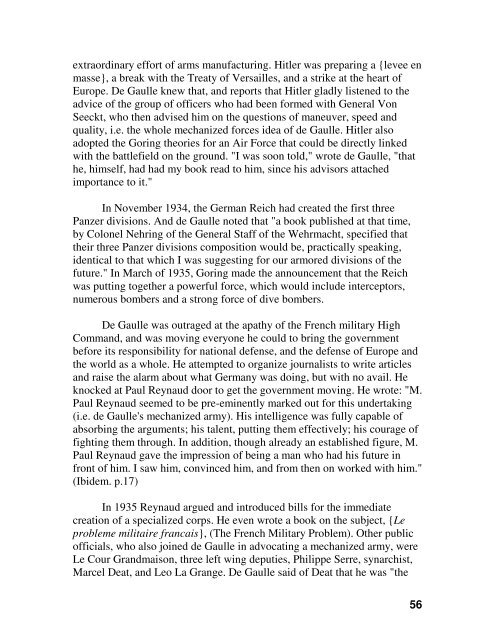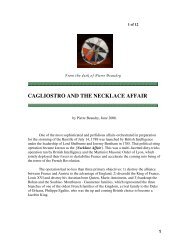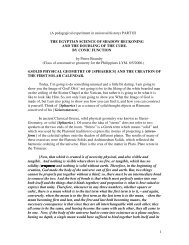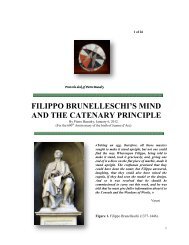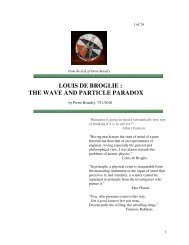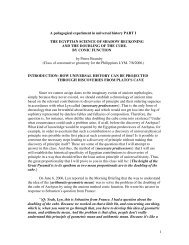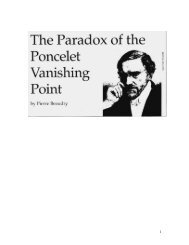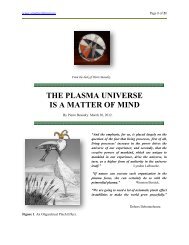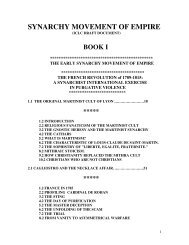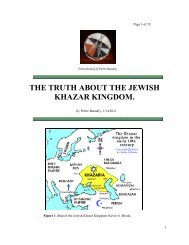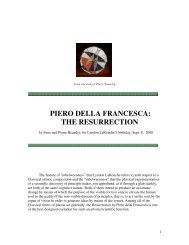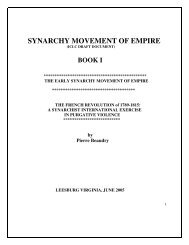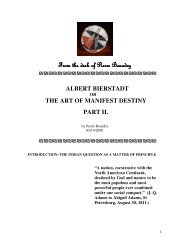synarchy movement of empire book ii - Pierre Beaudry's Galactic ...
synarchy movement of empire book ii - Pierre Beaudry's Galactic ...
synarchy movement of empire book ii - Pierre Beaudry's Galactic ...
Create successful ePaper yourself
Turn your PDF publications into a flip-book with our unique Google optimized e-Paper software.
extraordinary effort <strong>of</strong> arms manufacturing. Hitler was preparing a {levee en<br />
masse}, a break with the Treaty <strong>of</strong> Versailles, and a strike at the heart <strong>of</strong><br />
Europe. De Gaulle knew that, and reports that Hitler gladly listened to the<br />
advice <strong>of</strong> the group <strong>of</strong> <strong>of</strong>ficers who had been formed with General Von<br />
Seeckt, who then advised him on the questions <strong>of</strong> maneuver, speed and<br />
quality, i.e. the whole mechanized forces idea <strong>of</strong> de Gaulle. Hitler also<br />
adopted the Goring theories for an Air Force that could be directly linked<br />
with the battlefield on the ground. "I was soon told," wrote de Gaulle, "that<br />
he, himself, had had my <strong>book</strong> read to him, since his advisors attached<br />
importance to it."<br />
In November 1934, the German Reich had created the first three<br />
Panzer divisions. And de Gaulle noted that "a <strong>book</strong> published at that time,<br />
by Colonel Nehring <strong>of</strong> the General Staff <strong>of</strong> the Wehrmacht, specified that<br />
their three Panzer divisions composition would be, practically speaking,<br />
identical to that which I was suggesting for our armored divisions <strong>of</strong> the<br />
future." In March <strong>of</strong> 1935, Goring made the announcement that the Reich<br />
was putting together a powerful force, which would include interceptors,<br />
numerous bombers and a strong force <strong>of</strong> dive bombers.<br />
De Gaulle was outraged at the apathy <strong>of</strong> the French military High<br />
Command, and was moving everyone he could to bring the government<br />
before its responsibility for national defense, and the defense <strong>of</strong> Europe and<br />
the world as a whole. He attempted to organize journalists to write articles<br />
and raise the alarm about what Germany was doing, but with no avail. He<br />
knocked at Paul Reynaud door to get the government moving. He wrote: "M.<br />
Paul Reynaud seemed to be pre-eminently marked out for this undertaking<br />
(i.e. de Gaulle's mechanized army). His intelligence was fully capable <strong>of</strong><br />
absorbing the arguments; his talent, putting them effectively; his courage <strong>of</strong><br />
fighting them through. In addition, though already an established figure, M.<br />
Paul Reynaud gave the impression <strong>of</strong> being a man who had his future in<br />
front <strong>of</strong> him. I saw him, convinced him, and from then on worked with him."<br />
(Ibidem. p.17)<br />
In 1935 Reynaud argued and introduced bills for the immediate<br />
creation <strong>of</strong> a specialized corps. He even wrote a <strong>book</strong> on the subject, {Le<br />
probleme militaire francais}, (The French Military Problem). Other public<br />
<strong>of</strong>ficials, who also joined de Gaulle in advocating a mechanized army, were<br />
Le Cour Grandmaison, three left wing deputies, Philippe Serre, synarchist,<br />
Marcel Deat, and Leo La Grange. De Gaulle said <strong>of</strong> Deat that he was "the<br />
56


